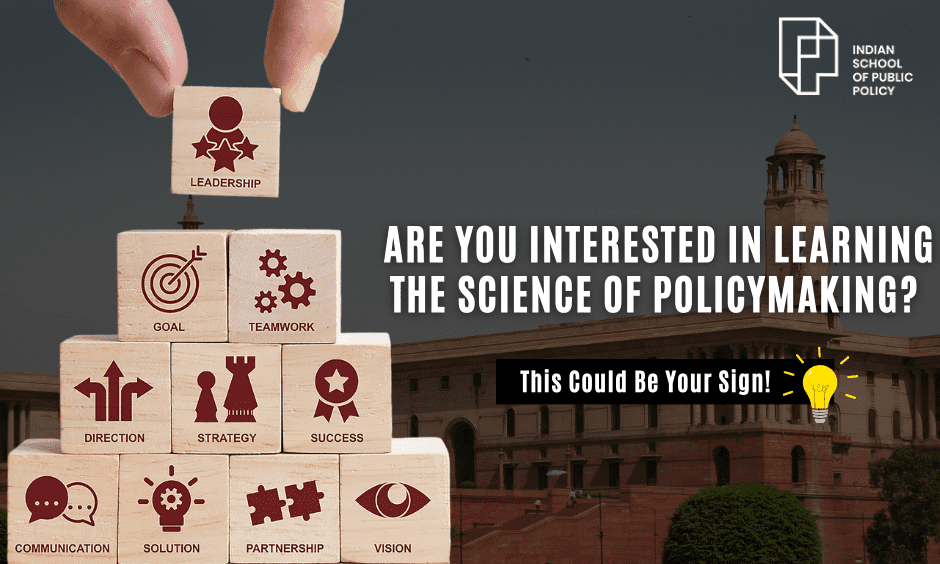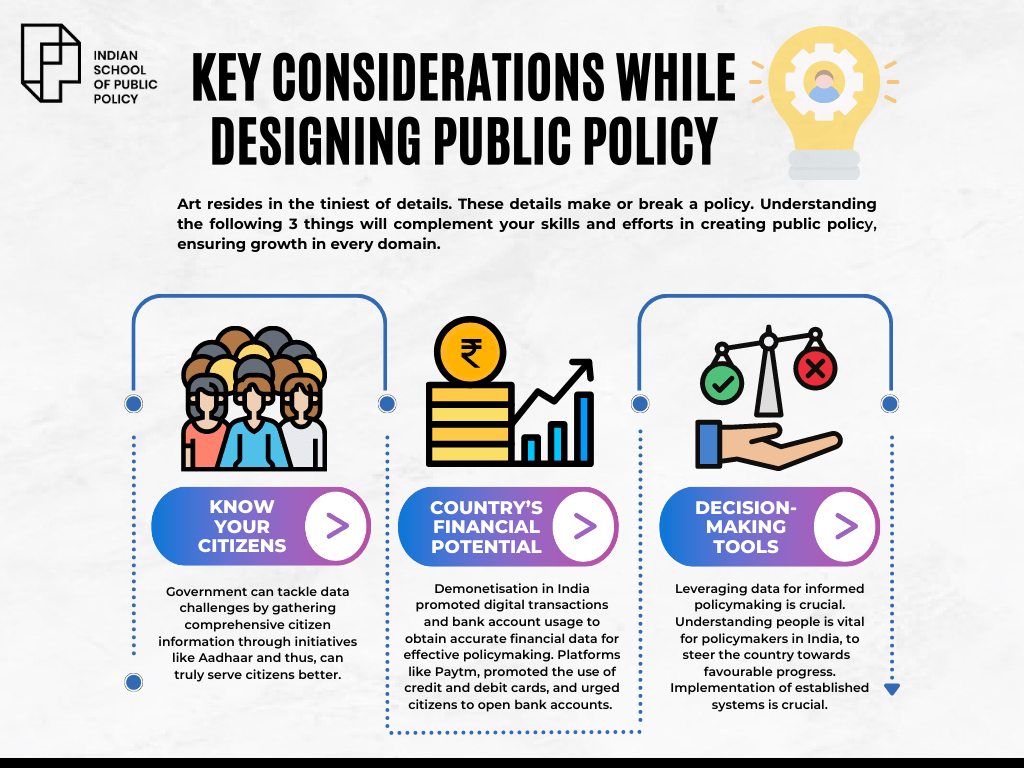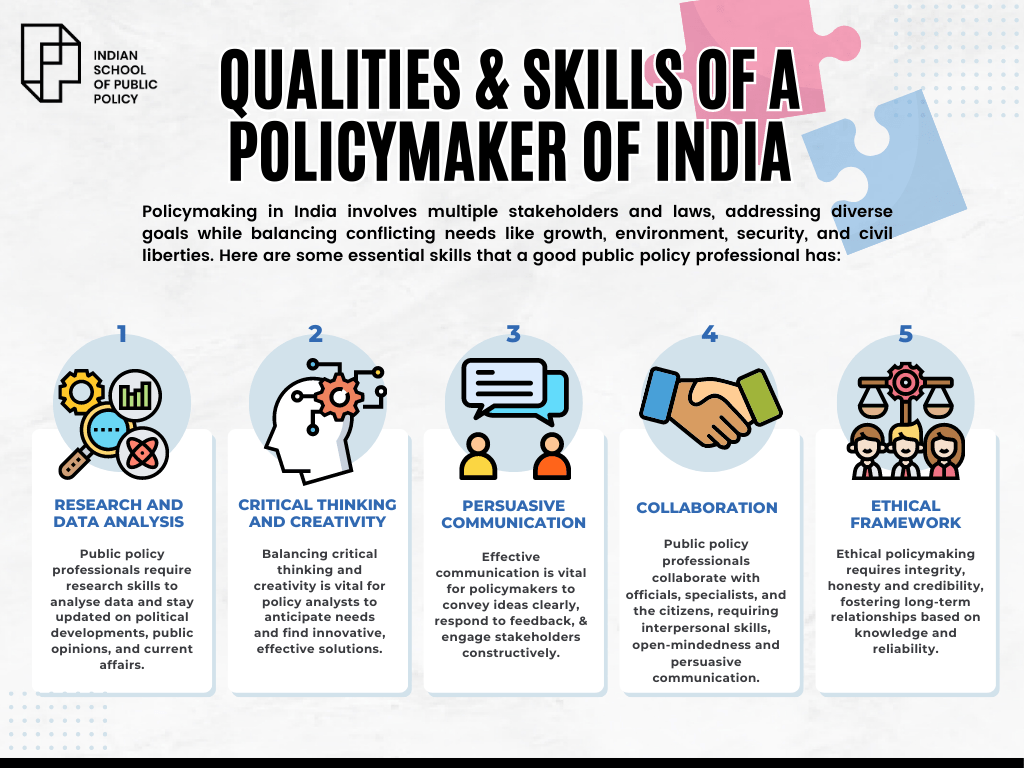
Are You Interested In Learning The Science Of Policymaking? This Could Be Your Sign!

The Indian Constitution provides the framework for public policies, which the government implements at different levels – central, state, and local. Making policies in India involves many people, like civil society groups, experts, and the public. Recently, a focus has been on making policies based on evidence, using data to solve complex problems. According to a report by the Centre for Policy Research, over 60% of major policy decisions in the last five years have incorporated data analytics and technology-driven insights.
Public policy covers a wide range of areas, like social welfare, economic development, foreign affairs, education, health, environment, defence, and more. It includes making laws and rules, in a diverse and complex country like India to achieve specific goals. One challenge is balancing different needs and interests, such as economic growth and protecting the environment or national security and individual freedoms. Another challenge is effectively implementing policies.
The role of technology in Policymaking
With advancements in artificial intelligence, machine learning, and big data analytics, India is witnessing a shift toward tech-driven policy solutions. Digital governance platforms like IndiaStack have streamlined processes such as subsidy distribution and financial inclusion, reducing leakages and improving transparency. Governments are increasingly using predictive analytics to assess policy impacts and improve decision-making.
For example: India’s CoWIN platform effectively managed vaccine distribution during the COVID-19 pandemic, showcasing how data-driven governance can enhance policy implementation.
Process Of Policymaking In India
Agenda Setting – At this stage, decision-makers identify and prioritise the most important issues that require government intervention. They carefully examine these matters to determine what the policy should focus on.
Policy Formulation – This stage is where the policy is created. Goals are set, costs are calculated, different policy options are considered, and potential impacts are analysed. Stakeholders are also identified and consulted to ensure their perspectives are taken into account.

The Executive – The executive branch, including the Council of Ministers and the Prime Minister’s Office, reviews and presents the policy to the Parliament for consideration.
The Parliament – The Parliament plays a crucial role in shaping public policies in India. It is responsible for scrutinising and passing bills related to policies, holding the Council of Ministers accountable. The policy becomes a law when it receives majority approval from the members of Parliament.
Implementation – Once the policy is enacted, the focus shifts to its effective implementation. This involves creating structures and mechanisms to ensure smooth execution at the grassroots level. For example, the Swachh Bharat Abhiyan initially faced resistance but ultimately succeeded through a combination of behavior change campaigns, celebrity endorsements, and financial incentives for sanitation infrastructure.
Evaluation – In this stage, the government assesses the policy’s effectiveness and its impact. Different measurement standards may be used, leading to varying evaluations of its success.
Policy Maintenance, Succession, or Termination – At this stage, policymakers decide whether the policy should be continued, improved, or terminated based on its performance and outcomes. Adjustments or modifications can be made if there are issues with the existing policy.
Challenges in the Indian Policymaking
One of the biggest hurdles in Indian policymaking is bureaucratic inertia, where delays in approvals and inter-departmental conflicts slow down the execution process. Policies often struggle with political interference, making continuity difficult across government transitions. Another major challenge is ensuring adequate funding and addressing corruption at different levels, which can impact the success of public policies.
All this requires policymakers to be equipped with all the necessary skills to be able to effectively navigate these complexities.
What Qualities & Skills Should A Policymaker In India Be Equipped With?
Here are essential skills that a good public policy professional should have –

Research and Data Analysis – Public policy professionals need strong research skills and must stay informed about political developments, public opinions, and current affairs. Proficiency in research methodologies and data analysis enables them to objectively understand facts and develop evidence-based perspectives on various issues.
Critical Thinking and Creativity – Balancing critical thinking with creativity is essential. Policy analysts with creative thinking can understand issues and anticipate needs that may arise from different approaches. This allows them to identify innovative solutions and determine the fairest and most effective course of action.
Persuasive Communication – Effective communication is vital for policymakers to convincingly present their ideas to government authorities and stakeholders. Strong verbal and writing skills, along with the ability to respond constructively to feedback, are essential for conveying messages clearly and precisely.
Collaboration – Public policy professionals must collaborate with elected officials, specialists, colleagues, and the public while developing policy proposals. This requires patience, open-mindedness, and strong interpersonal skills. Effective policy advising involves establishing connections, following appropriate channels, and presenting compelling cases for ideas and perspectives.
Ethical Framework – Ethical considerations are important in policy-making. Public policy professionals should adhere to universal values such as integrity, honesty, and credibility. Building a reputation for being knowledgeable, honest, and reliable in providing information and opinions to policymakers is crucial. Maintaining integrity means following value systems, codes of conduct, and regulations that govern public policy. These ethical principles foster and sustain long-term relationships.
The list doesn’t end here. You can have all the skills in the world, but if you don’t understand your country, the outcome of all your efforts will seldom be favourable.
Things Policymakers In India MUST Keep In Mind While Designing Public Policies
Art resides in the tiniest of details. These details are what determine the success of your policies. Understanding these 3 things will complement all your skills and efforts in creating public policies ensuring the growth of the country, in every area.
Know Your Audience, In This Case, Your Citizens
Due to society’s ever-changing nature, with people moving in and out of the country, and families changing in size, the government faced difficulties in keeping its data sources updated. As a result, it couldn’t effectively cater to the needs of the population.
However, this situation has now changed. The government is actively working to gather comprehensive citizen information through a central database through initiatives like the Aadhaar card, which provides a unique identification number and collects detailed background data, including biometric scans. Additionally, there is a requirement for all Indians to open bank accounts and participate in the formal economy. By understanding its citizens, the government can truly serve them better than ever.
Understand The Country’s Financial Potential
India’s economy is a somewhat chaotic system. From the outside, it may seem like companies are thriving and people are doing well, but in a predominantly cash-heavy economy, making it challenging to get a clear picture.
However, everything changed on 8 November 2016 when Prime Minister Narendra Modi made a surprising announcement demonetising the largest currency notes. He encouraged digital transactions on platforms like Paytm, promoted the use of credit and debit cards, and urged citizens to open bank accounts. With these measures, he aimed to propel the country into a new era where formal transactions and accurate data would provide the government with a reliable understanding of the nation’s financial well-being. This, in turn, would enable the government to create appropriate policies based on objective insights.
Identifying Gaps, Opportunities, and Decision-Making Tools
Data has always been collected, but, not used productively. In recent years, however, data is being leveraged to gain insights into the current situation and to develop new policies. Decision-makers now have accurate information about public services, and the use of objective data in policy-making is making a significant impact. For instance, the government of Andhra Pradesh has created a dashboard that tracks agricultural yield and school attendance rates. This data helps them identify areas that need attention and informs their policy interventions. Studies show that states adopting data-driven governance models, such as Andhra Pradesh’s real-time monitoring dashboard, have seen a 15% improvement in agricultural productivity and a 20% rise in school attendance.
India is undergoing rapid changes, and it’s crucial for policymakers to understand the people and their capabilities to ensure the country continues to progress in the right direction. The government has already established the necessary systems for this purpose, and the focus now should be on effectively implementing them.
All this requires educational qualifications and extensive training. Here are
Top Public Policy Schools In India
If you are interested in learning the science of policy-making, here’s a list of top Public Policy Schools in India –
- National Law School of India University (NLSIU), Bengaluru
- Indian School of Public Policy (ISPP), New Delhi
- Tata Institute of Social Sciences (TISS), Mumbai
- National Institute of Public Finance and Policy (NIPFP), New Delhi
Each institution has its unique strengths, faculty expertise, and programme offerings, so it’s essential to research further to find the best fit for your interests and career goals. Although all schools mentioned above are top-ranked, ISPP however, outshines them all. Want to know why?
ISPP & Its PDM Programme
Established in 2019 by India’s renowned public policy think tank, the Centre for Civil Society (CCS), the Indian School of Public Policy (ISPP) has been created in collaboration with influential policymakers, experts, and influencers. ISPP is committed to providing world-class faculty, strong industry connections, and an innovative approach to policy design and management, aiming to transform the field of policymaking.
The flagship programme – Post Graduate Programme in Public Policy, Design, and Management, offered by ISPP is designed for individuals who want to make a difference in public policy. This comprehensive one-year course consists of seven terms, each lasting seven weeks, guiding students through the science of policymaking.
The programme offers a deep understanding of public policies and equips students with the knowledge and skills to become proficient policy analysts and executives. Throughout the programme, students will gain insights into various aspects such as public policy, financial considerations, ethical dilemmas, and effective practices in public administration and policy implementation, which are the core focus areas of the program’s curriculum.
Register your Interest to Study at ISPP
FAQs
What are the key stages in the policymaking process in India?
The process includes agenda setting, policy formulation, executive review, parliamentary approval, implementation, evaluation, and policy maintenance or termination.
How does technology impact policymaking in India?
Technology enables data-driven decision-making, improves transparency, and enhances efficiency through platforms like IndiaStack and CoWIN.
What challenges do policymakers face in India?
Policymakers struggle with bureaucratic delays, political interference, funding constraints, and corruption, which can affect policy success.
What essential skills should an Indian policymaker have?
A policymaker should possess research and data analysis skills, critical thinking, persuasive communication, collaboration abilities, and strong ethical values.
How does India’s financial system influence public policy decisions?
Policies are shaped by economic conditions, with reforms like demonetisation and digital banking initiatives helping policymakers make informed financial decisions.


